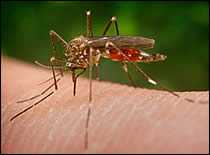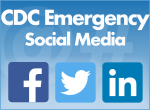Fact Sheet: Protect Yourself from Animal- and Insect-Related Hazards After a Disaster
Highlights
- Avoid wild or stray animals.
- Protect yourself from mosquitoes by using insect repellents that contain DEET or Picaridin.
- To avoid attracting rodents, remove potential sources of food, water, and shelter such as garbage, dirty dishes, and debris.
- Be aware of snakes that may be swimming in the water to get to higher ground and those that may be hiding under debris or other objects.
General
- Avoid wild or stray animals.
- Call local authorities to handle animals.
- Secure all food sources and remove any animal carcasses to avoid attracting rats.
- Get rid of dead animals, according to guidelines from your local animal control authority, as soon as you can. See Animal Disposal for answers to frequently asked questions.
For guidance on caring for animals entering shelters and for people working with or handling animals following an emergency, see Interim Guidelines for Animal Health and Control of Disease Transmission in Pet Shelters.
For more information, contact your local animal shelter or services, a veterinarian, or the Humane Society for advice on dealing with pets or stray or wild animals after an emergency. Also see Protect Your Pets in an Emergency.
Avoid Mosquitoes
 Rain and flooding in a hurricane area may lead to an increase in numbers of mosquitoes, which can carry diseases, such as West Nile virus or dengue fever. In most cases, the mosquitoes will be pests but will not carry communicable diseases. Local, state, and federal public health authorities will be actively working to control the spread of any mosquito-borne diseases. For more information on West Nile virus, see CDC’s West Nile virus Web site.
Rain and flooding in a hurricane area may lead to an increase in numbers of mosquitoes, which can carry diseases, such as West Nile virus or dengue fever. In most cases, the mosquitoes will be pests but will not carry communicable diseases. Local, state, and federal public health authorities will be actively working to control the spread of any mosquito-borne diseases. For more information on West Nile virus, see CDC’s West Nile virus Web site.- To protect yourself from mosquitoes, use screens on dwellings; wear long pants, socks, and long-sleeved shirts; and use insect repellents that contain DEET or Picaridin. Follow directions on the product label and take care when using DEET on small children. More information about these and other recommended repellents can be found in the fact sheet Updated Information Regarding Insect Repellents.
- To help control mosquito populations, drain all standing water left outdoors in open containers, such as flower pots, tires, pet dishes, or buckets.
Prevent Contact With Rodents
- Remove food sources, water, and items that can provide shelter for rodents.
- Wash dishes, pans, and cooking utensils immediately after use.
- Dispose of garbage and debris as soon as possible.
For more information, see Rodent Control After a Disaster.
Prevent or Respond to a Snake Bite
- Be aware of snakes that may be swimming in the water to get to higher ground and those that may be hiding under debris or other objects.
- If you see a snake, back away from it slowly and do not touch it.
- If you or someone you know are bitten, try to see and remember the color and shape of the snake, which can help with treatment of the snake bite.
- Keep the bitten person still and calm. This can slow down the spread of venom if the snake is poisonous. Seek medical attention as soon as possible. Dial 911 or call local Emergency Medical Services. Apply first aid if you cannot get the person to the hospital right away.
- Lay or sit the person down with the bite below the level of the heart.
- Tell him/her to stay calm and still.
- Cover the bite with a clean, dry dressing.
For more information, see How to Prevent or Respond to a Snake Bite.
For more information, see the following:
- Centers for Disease Control and Prevention
- American Veterinary Association
- Texas A&M University
- Page last reviewed: September 16, 2005
- Page last updated: July 25, 2014
- Content source:


 ShareCompartir
ShareCompartir

